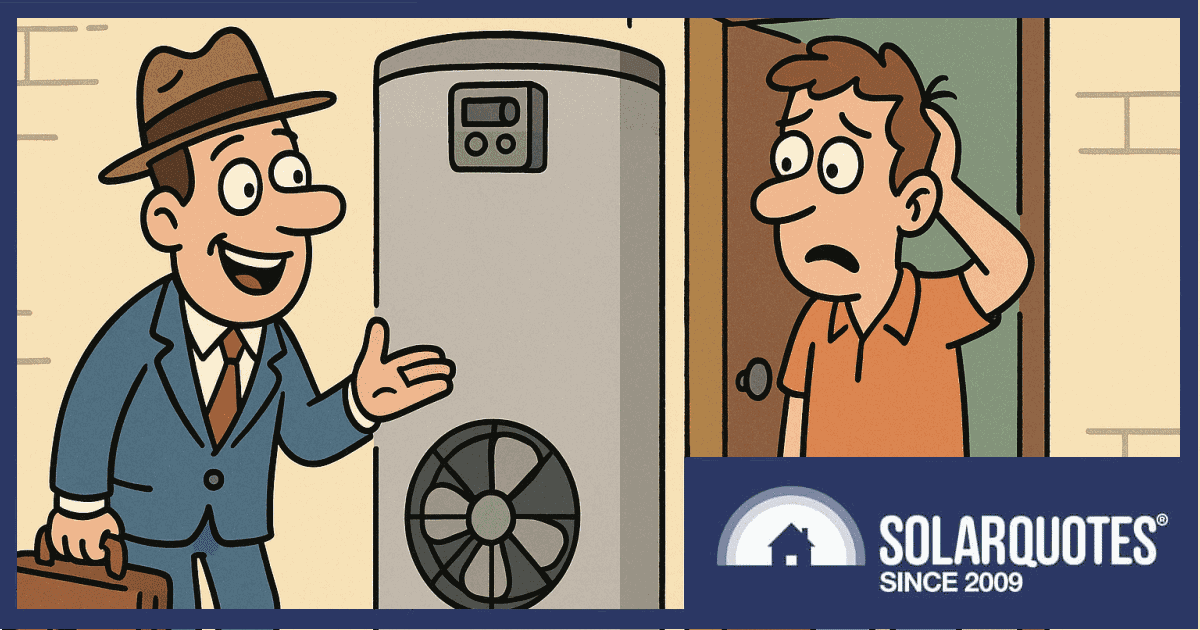

Doorknocking will be banned for New South Wales’ Energy Savings Scheme (ESS) and Peak Demand Reduction Scheme (PDRS) from the beginning of August, and a new warranty requirement for heat pump hot water systems supported under the ESS will kick in.
What Is The Peak Demand Reduction Scheme?
As the name suggests, The PDRS aims to reduce peak electricity demand in NSW; particularly on summer afternoons and evenings.
Tradeable Peak Reduction Certificates (PRCs) are created for eligible activities, such as installing energy-efficient pool pumps, air conditioners or a home battery participating in a Virtual Power Plant (VPP) program. The value of these certificates minus admin fees is provided as a rebate, payment or discount.
The PDRS was also the vehicle for NSW’s battery rebate for a bit, but the state rebate was ditched after a series of regulatory headaches in getting it to play nice with the recently introduced federal battery rebate.
More information on the PDRS can be found here.
What Is The Energy Savings Scheme?
This scheme provides NSW homes and businesses with financial incentives to invest in projects reducing energy consumption; such as installing new energy-efficient equipment or making improvements to current systems.
For households, among eligible appliances are solar or heat pump hot water systems. Discounts can range between $400 and $670 when replacing an electric water heater with a heat pump or $190 and $310 when replacing a gas water heater.
The ESS works under a certificate trading scheme where accredited businesses create and sell Energy Savings Certificates (ESCs) based on the energy savings achieved. And as with PRCs, the value of these certificates fluctuates based on market conditions.
Further information on the ESS can be viewed here.
Heat Pump Hot Water System Warranty Minimum
As well as the doorknocking ban coming into effect in August for both the ESS and PDRS, the NSW government is introducing a 5-year minimum product warranty requirement for heat pump hot water systems installed under the Energy Savings Scheme.
If you look at our heat pump comparison table, you’ll notice a few manufacturers have different warranty lengths depending on the system component, such as:
- 7 years on the tank
- 3 years for the pump
- 1 year warranty on electronics
It’s not explicitly stated if the 5-year minimum requirement will apply to “whole of system” for incentive-supported installations, but it would certainly make sense.
Door-To-Door Sales Are Too Often Diabolic
Generally speaking, door-to-door sales have always problematic. It’s surprising some businesses still bother with it given the amount of bad press and results of investigations into the activity over the years; particularly with regard to solar and energy efficiency products.
But it continues because it works. One of the reasons the practice is still attractive to unscrupulous players is because the profit margins on selling cheap, poor quality products installed by underpaid and/or sub-standard (and sometimes unqualified) contractors at exorbitant prices can be lucrative, and often with finance also involved.
While buying anything from a doorknocker is fraught with risk, if you decide to do so, it’s important to know your rights. For example, in New South Wales, there’s a 10 business day cooling off period on any contract signed through door-to-door sales. But there are extended cooling-off periods if the salesperson has breached any state laws, ranging from 3 months to 6 months.
The doorknocking ban and warranty requirement comes after NSW’s Building Commission announced it had “identified significant non-compliance” in hot water heat pump installations under the Energy Saving Scheme early this year.
The NSW Government says:
“We are taking these steps to support businesses and households to make informed decisions and receive high quality upgrades”.
And on that note, learn everything you need to know about choosing a good heat pump hot water system here. You can also check out the best heat pumps in 2025, as voted by installers in the SolarQuotes network.
For summaries of incentives for solar panels, batteries, EVs and energy-efficient appliances across Australia, see our regularly-updated rebates and subsidies page.
